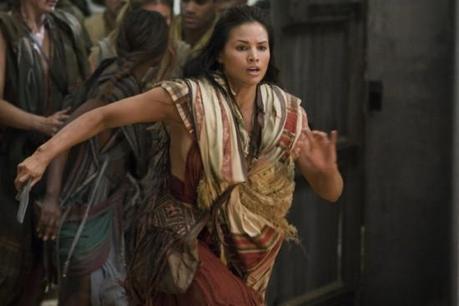Contributor: John Keegan
With the basics established in the season premiere, this episode takes up the task of setting up more of the plot and character arcs. It also serves to expound on Spartacus’ philosophy as he moves forward, transforming his movement from a simple act of retaliation and retribution to a true rebellion against Rome.

Part of the equation, of course, is growing the ranks from a gang of former gladiators to something closer to an army, and that means releasing the slaves they find as they hunt down Naevia. Of course, that’s easier said than done. Not only is it a question of doing so without attracting attention, but there’s always been a difference in status between gladiator and typical slave. And the gladiators want the benefits of freedom, some a little more than others.
Those issues of assumed class among the fugitives are a major theme, and not just because of how Tiberias is treated by the former denizens of the House of Batiatus. It makes perfect sense that Spartacus and Mira would be together at this point, given their past history. But it also makes sense that some of the new “recruits” would question her motives. After all, slaves have been shown since the start of the series positioning themselves in every possible way, most often sexually.
Part of the inequity is that the gladiators have been trained to fight. Not just fight, but fight dirty. It gives them a distinct advantage over the Roman soldiers that have been (and will continue to be) sent their way, but it also means that it’s that much harder to train most of the slaves that they are likely to liberate. Spartacus, Crixus, and the others have plenty of experience in learning how to fight, but precious little in how to teach others.
History tells us that Oenomaus eventually becomes a key member of the Spartacus’ rebellion, and clearly, this episode makes the case that he is needed sooner rather than later. And one would imagine that they finally gave us a closer look at his formative years in the House of Batiatus to set the stage for his long journey to that role. But who better to derail that possibility than Ashur?
That he would be involved in the intrigue with Lucretia is hardly a shock. Since he wasn’t among the fugitives, it was a good bet that he would show up in Capua, scheming his way back into someone’s favor. And he would make a logical trigger for Lucretia’s restoration, which would definitely make things interesting for Glaber and Ilithyia. And as mentioned previously, this would explain some of the distractions that would lead Glaber to make the mistakes that allow Spartacus and this rebellion to prosper.
Writing: 2/2
Acting: 2/2
Direction: 2/2
Style: 2/4
Final Rating: 8/10

